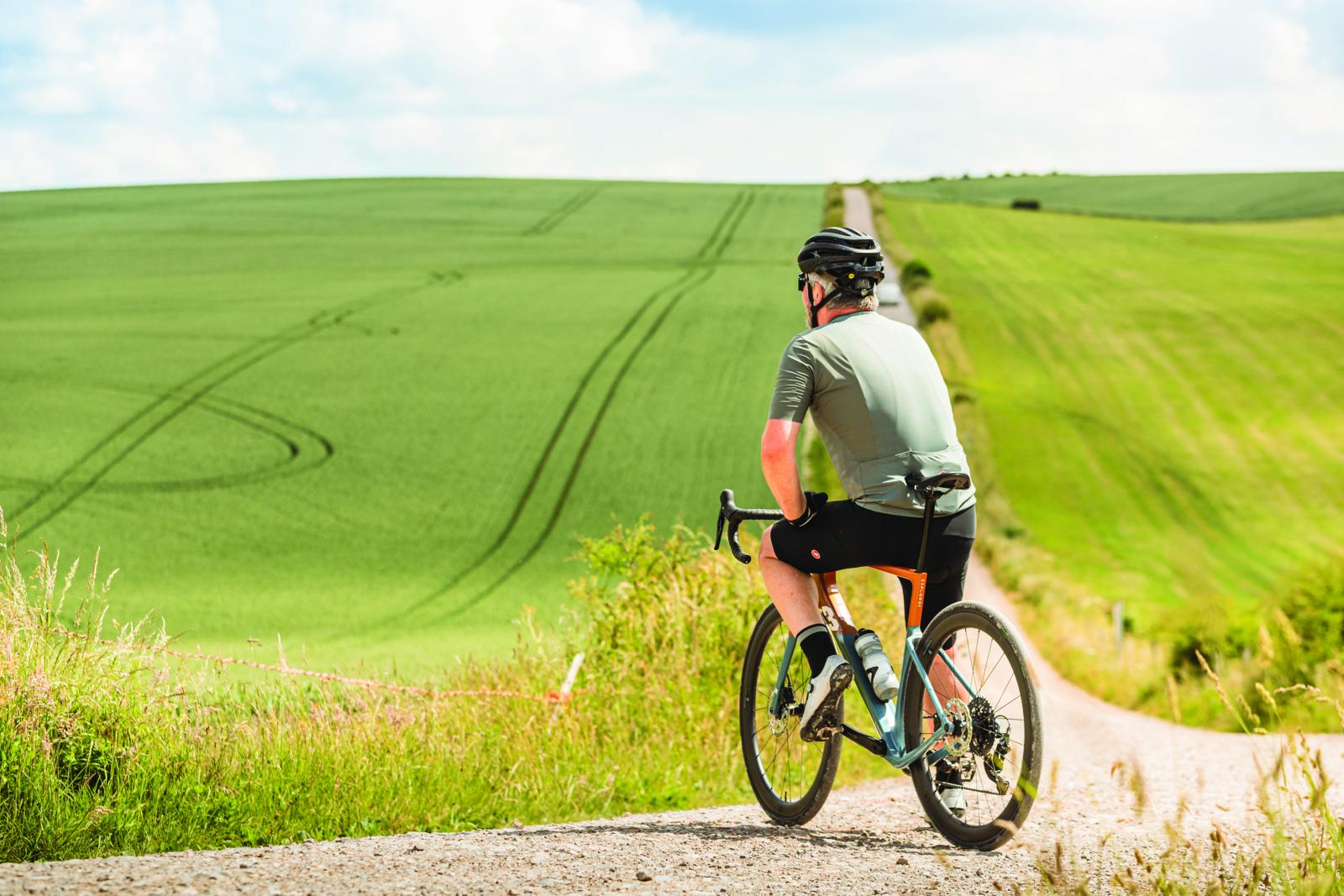The Specialized Crux Expert is a lightweight and fun gravel bike that handles well, but it's held back by an uncompetitive build for the high asking price.
The Crux started out as Specialized’s pure cyclocross race bike, but this latest iteration moves away from the relatively small market for CX bikes and into the much more popular gravel arena.
This Crux steps away from modern gravel bike trends, eschewing the aero optimisation of BMC’s Kauis, or integration of Factor’s Ostro Gravel, and takes cues from its own Aethos road bike.
That means it’s lightweight and very simple – no integrated cockpit, a standard seat binder, little in the way of aero-optimisation, and a threaded bottom bracket.
In its top-spec £11,300 S-Works trim, Specialized claims the Crux is the world’s lightest gravel bike, but does that make it a great gravel bike?
The potential is certainly here in abundance, but this spec leaves plenty on the table.
Specialized Crux Expert frame details
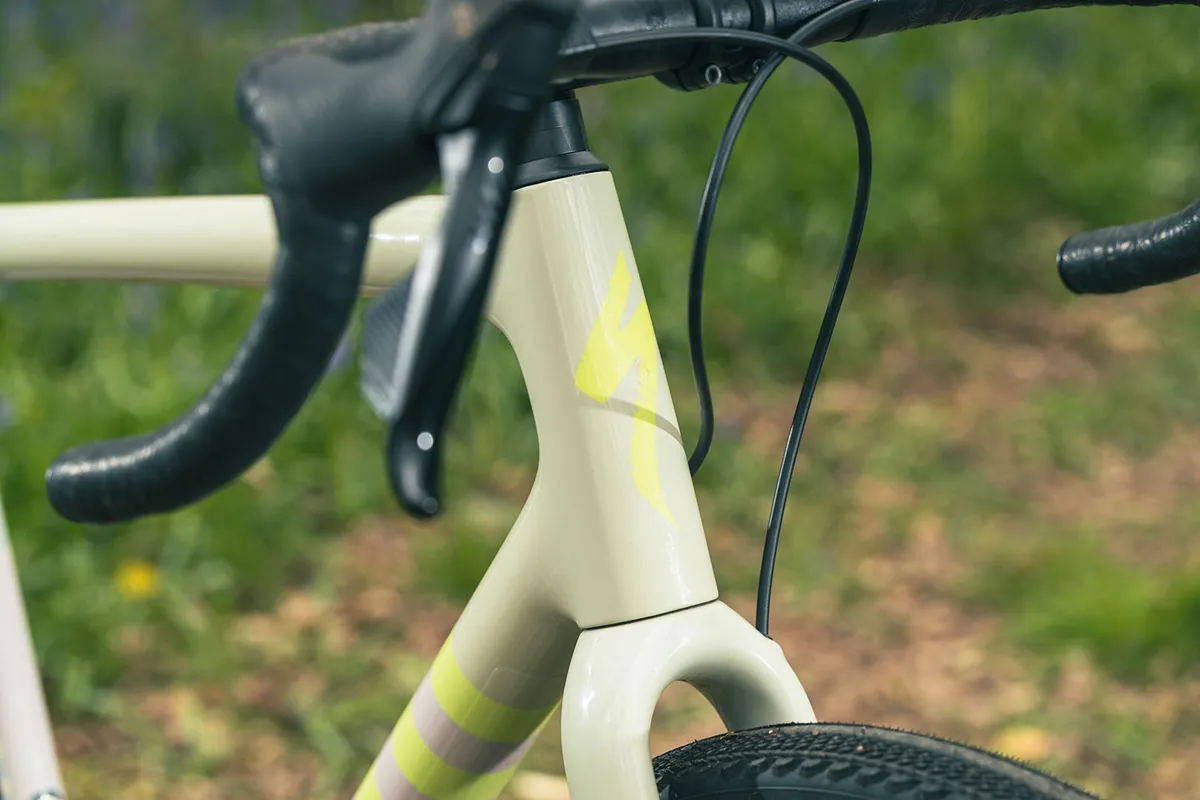
The Crux’s predominantly round tubes are combined with a standard diamond frame shape and slender fork, which give it a certain elegance and almost retro simplicity.
This is especially true when compared to the aero extremes of bikes like Factor’s Ostro Gravel, the burly oversizing of Ridley’s Kanzo Adventure, the pseudo suspension of the Pivot Vault, or even Specialized’s own Diverge STR.
The Crux is also stripped back on some common features – there are no mudguard/fender eyelets, top tube bag mounts, rack mounts, or multi-mounts on the forks.
However, you get three sets of bottle bosses on the seat tube, top and bottom of the downtube.
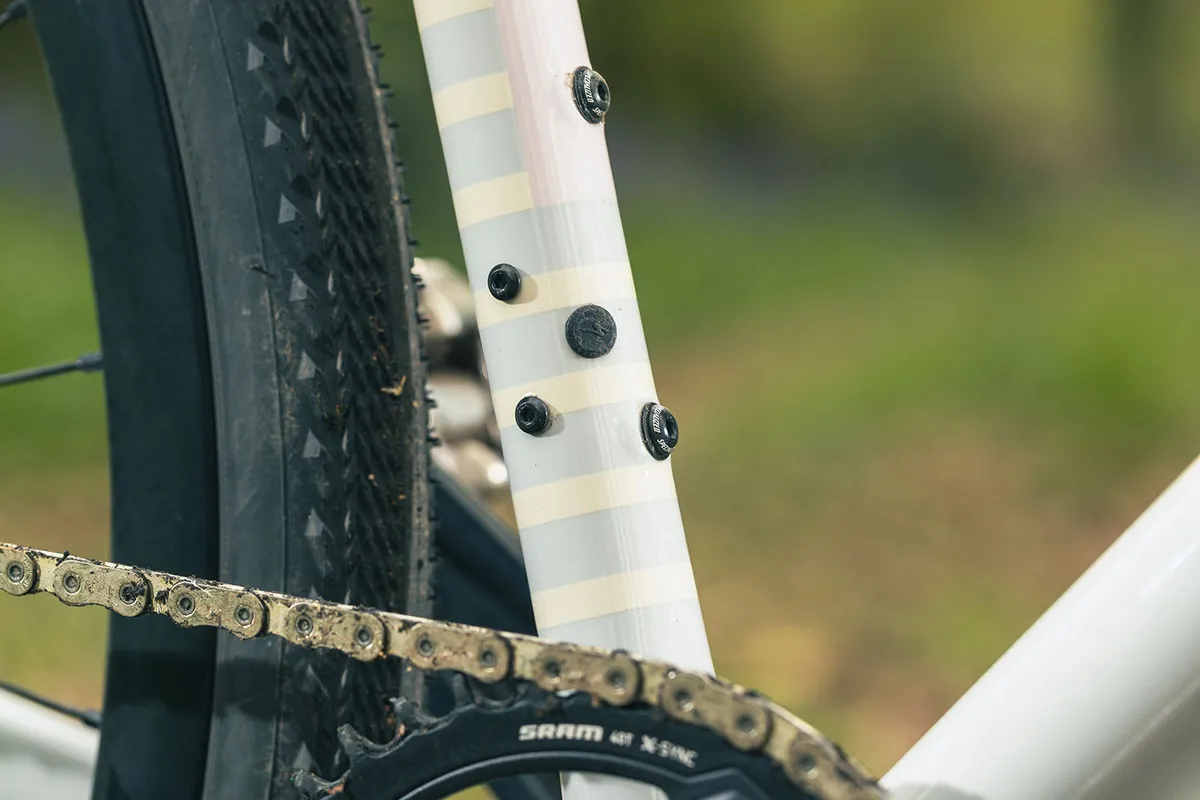
Mounts for a front derailleur mount (electronic only) are retained too, even though Specialized doesn’t offer any 2x builds.
The Crux has a standard headset with internal routing for the brake hoses starting at the fork crown on the front and on the downtube for the rear.
The frame takes a round 27.2mm seatpost, so you could run a dropper post if desired, and it has a mechanic-friendly ISO threaded bottom bracket.
There’s space for an impressively-wide 47mm gravel tyres on 700c wheels, or 2.1 inches if you drop down to the smaller 650b standard.
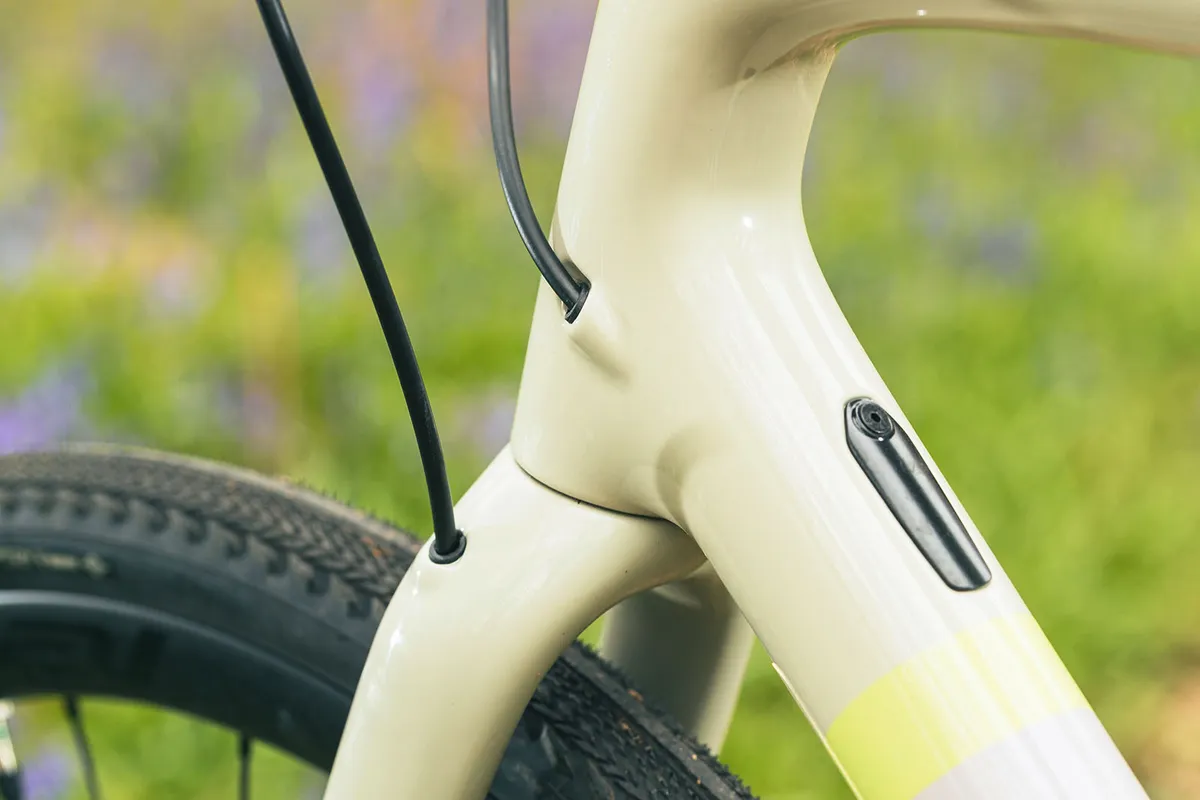
The Crux Expert frame, much like the Aethos Comp, gets Specialized’s cheaper and heavier Fact 10r carbon blend, instead of the premium 12r carbon seen on the S-Works version.
This translates to a Crux Expert frame weight of 825g (56cm, painted), compared to 725g for an equivalent S-Works frame. Both share the same 400g, Fact 12r carbon fork.
Considering the S-Works version cost £4,500 for the frameset alone, the Crux Expert (£6,300 for the whole bike) offers a significant improvement in value for only a 100g weight penalty.
Specialized Crux Expert geometry
The geometry is very much in the road-biased, fast-gravel racing sphere. My 58cm test bike has a relatively low 598mm stack height combined with a long 405mm reach – figures that wouldn’t feel out of place on a pure road bike.
Specialized’s all-rounder road racing bike, the Tarmac SL7, has a 581mm stack and the same 405mm reach in the same size, for example, and both run a 110mm stem in this size too.
The Crux has a slightly relaxed head angle at 72.25 degrees and a tall 401mm fork with a longer 62mm trail. Both work in combination to help stabilise the handling when things get rough.
In contrast, though the seat tube angle is a relatively steep 73.5 degrees, this is effectively slackened somewhat by the inclusion of a 20mm setback seatpost.
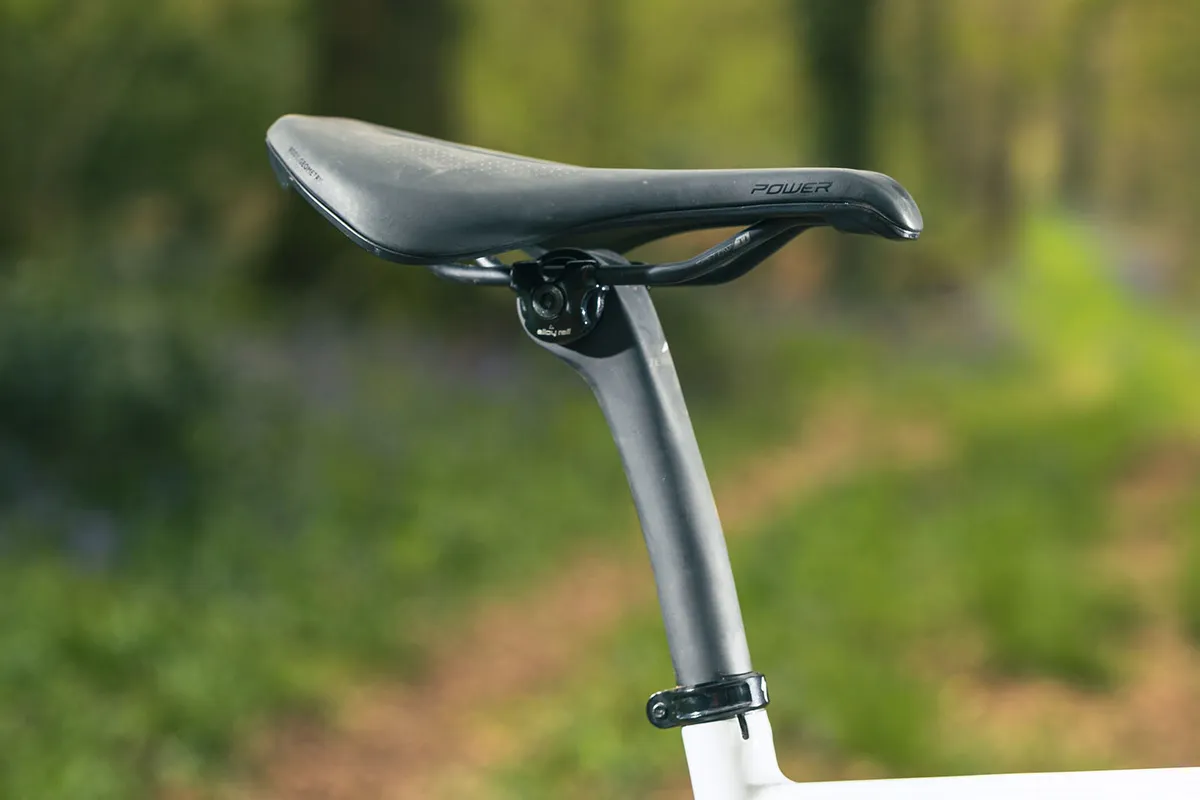
This helps to shift your weight further back for stability and traction off-road, but if you wanted to swap to an inline seatpost for a pedalling position straight over the cranks, then this is easily changed.
Lengthy 425mm chainstays facilitate the wide tyre clearances of the frame, and the 1,045mm wheelbase is long (though not excessively so) to balance between steering responsiveness and stability.
| | 49 | 52 | 54 | 56 | 58 | 61 |
|---|---|---|---|---|---|---|
| Seat angle (degrees) | 75.5 | 74 | 74 | 73.5 | 73.5 | 73.5 |
| Head angle (degrees) | 70.5 | 71.25 | 71.5 | 72 | 72.25 | 72.5 |
| Chainstay (mm) | 425 | 425 | 425 | 425 | 425 | 425 |
| Seat tube (mm) | 466 | 496 | 521 | 546 | 576 | 606 |
| Top tube (mm) | 512 | 539 | 549 | 568 | 582 | 599 |
| Head tube (mm) | 100 | 115 | 130 | 147 | 167 | 190 |
| Fork offset (mm) | 50 | 50 | 50 | 50 | 50 | 50 |
| Trail (mm) | 74 | 69 | 67 | 64 | 62 | 60 |
| Bottom bracket drop (mm) | 74 | 74 | 72 | 72 | 72 | 72 |
| Bottom bracket height (mm) | 284 | 284 | 286 | 286 | 286 | 286 |
| Wheelbase (mm) | 1008 | 1014 | 1023 | 1033 | 1045 | 1059 |
| Standover (mm) | 749 | 772 | 794 | 816 | 841 | 866 |
| Stack (mm) | 530 | 547 | 560 | 578 | 598 | 621 |
| Reach (mm) | 375 | 382 | 388 | 397 | 405 | 415 |
| Crank length (mm) | 165 | 170 | 172.5 | 172.5 | 175 | 175 |
| Handlebar width (mm) | 380 | 400 | 420 | 420 | 440 | 440 |
| Stem length (mm) | 70 | 80 | 90 | 100 | 110 | 110 |
Specialized Crux Expert build
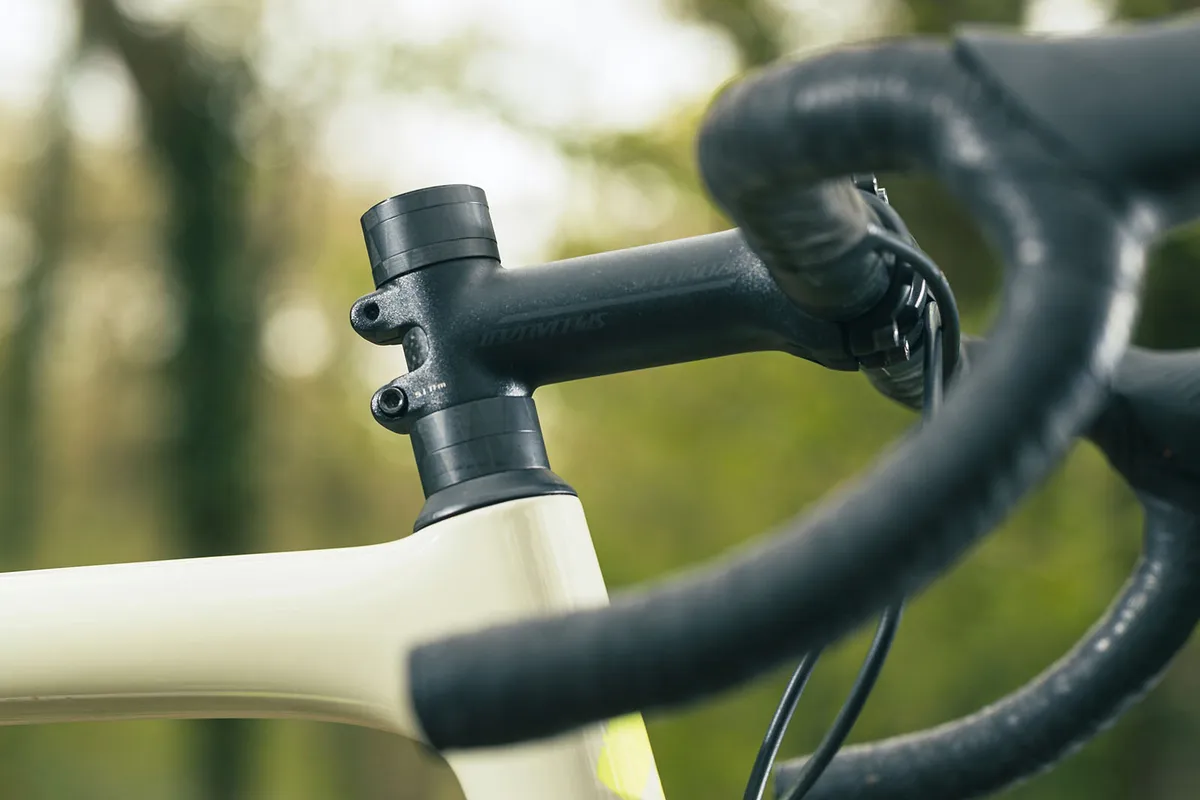
The Specialized Crux Expert build is somewhat of a mixed bag for the price.
Starting up front, the alloy Specialized Pro-SL stem does its job – it’s well-finished and simple in design.
The alloy Specialized bar likewise has a good shape, with a subtle flare and a compact drop, but seeing a basic alloy bar specced on a £6,300 feels like being short-changed.
Thankfully, it's wrapped in excellent Supacaz tape that’s tacky to the touch and thick enough to make a difference to comfort.
The Roval Terra carbon post (£225 aftermarket) is a premium item and it’s topped with an Expert level version of the ever-popular Specialized Power saddle.
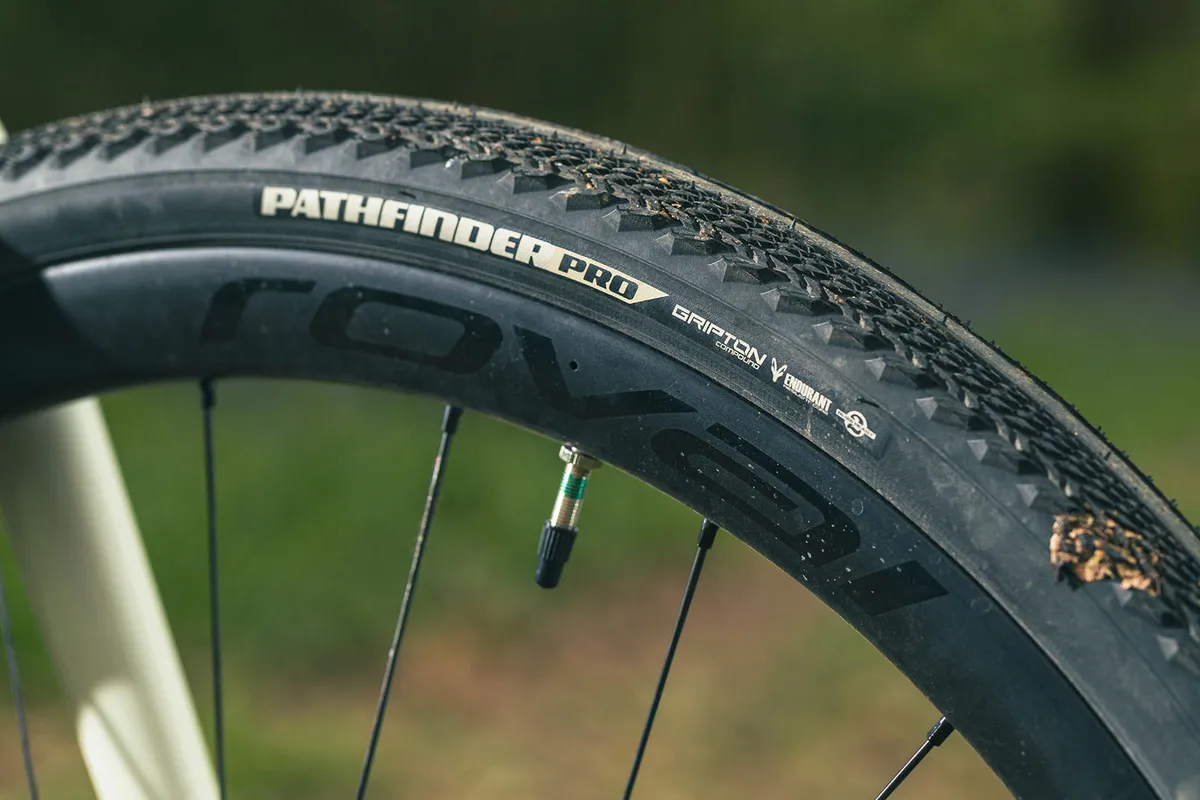
The bike rolls on Roval’s Terra C wheelset, available separately in the USA for $1,000.
These carbon tubeless-ready wheels weigh in at a claimed 1,620g (719g front, 891g rear) and have a 32mm deep, hooked rim with a gravel friendly, 25mm wide internal width.
Carbon wheels are a step up over alloy models (at least in bragging rights) but the Terra Cs aren’t as light as a lot of the competition.
Zipp’s 303 Firecrest as found on BMC’s Kaius are 1,409g a pair, and the more affordable 303s 1,540g, Giant’s CXR1’s as found on the Revolt X are 1,398g.
Even the alloy Fulcrum 500’s found on Orbea’s £1,000 cheaper Terra are only 140g heavier.
With the Crux, Specialized shouts about its lightweight – but the extra expense of moving to a carbon wheelset that's barely lighter than some alloy wheels doesn’t seem like the best use of a budget.
The wheels are fitted with Specialized’s low-tread Pathfinder gravel tyres in a size 700 x 38c, and are fitted with standard inner tubes rather than set up tubeless (though both wheels and tyres are tubeless-ready, so if you want to convert them you’ll only need tubeless valves and sealant).
Specialized Crux Expert ride impressions
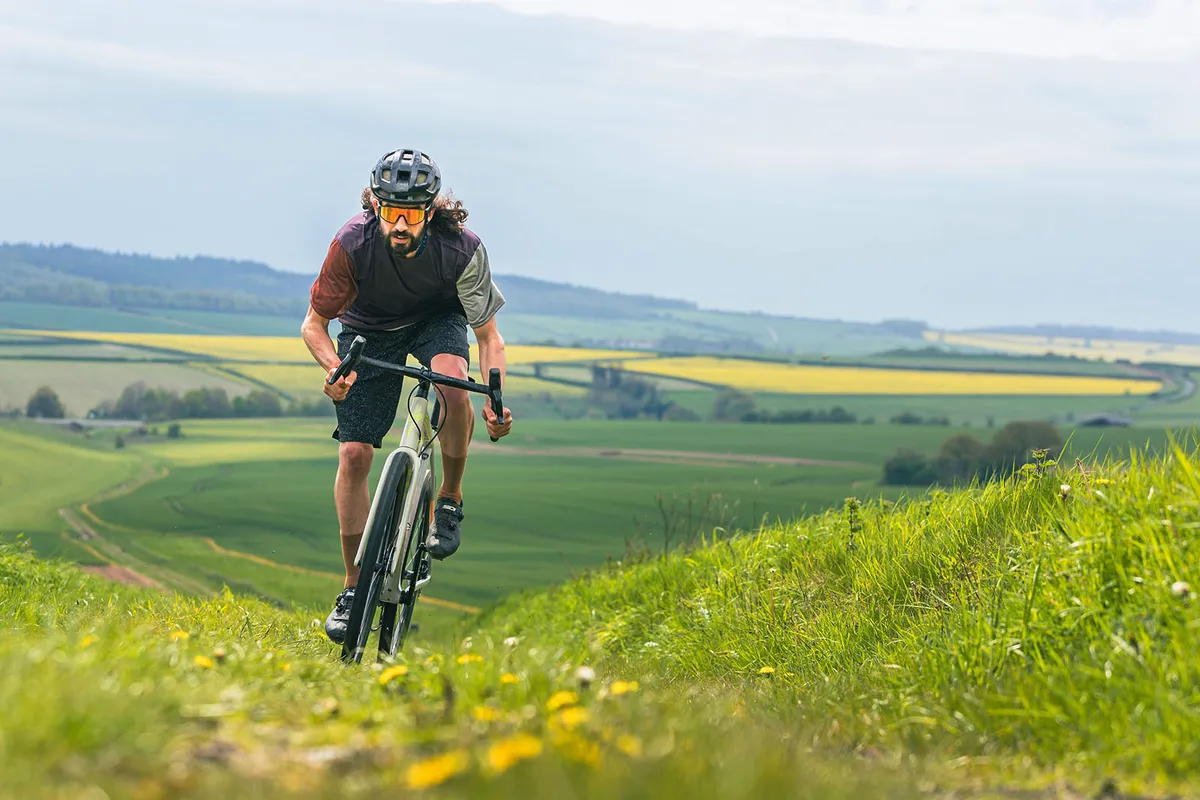
The Crux’s simple lines, low weight and sporty ride position make it as capable on the road as the more futuristic BMC Kaius or Factor Ostro Gravel.
It’s a lively ride, with a stiff frame that revels in out-of-the-saddle efforts and really allows you to get stuck into climbs on both tarmac and gravel.
The SRAM Rival eTap AXS XPLR drivetrain works as well as expected.
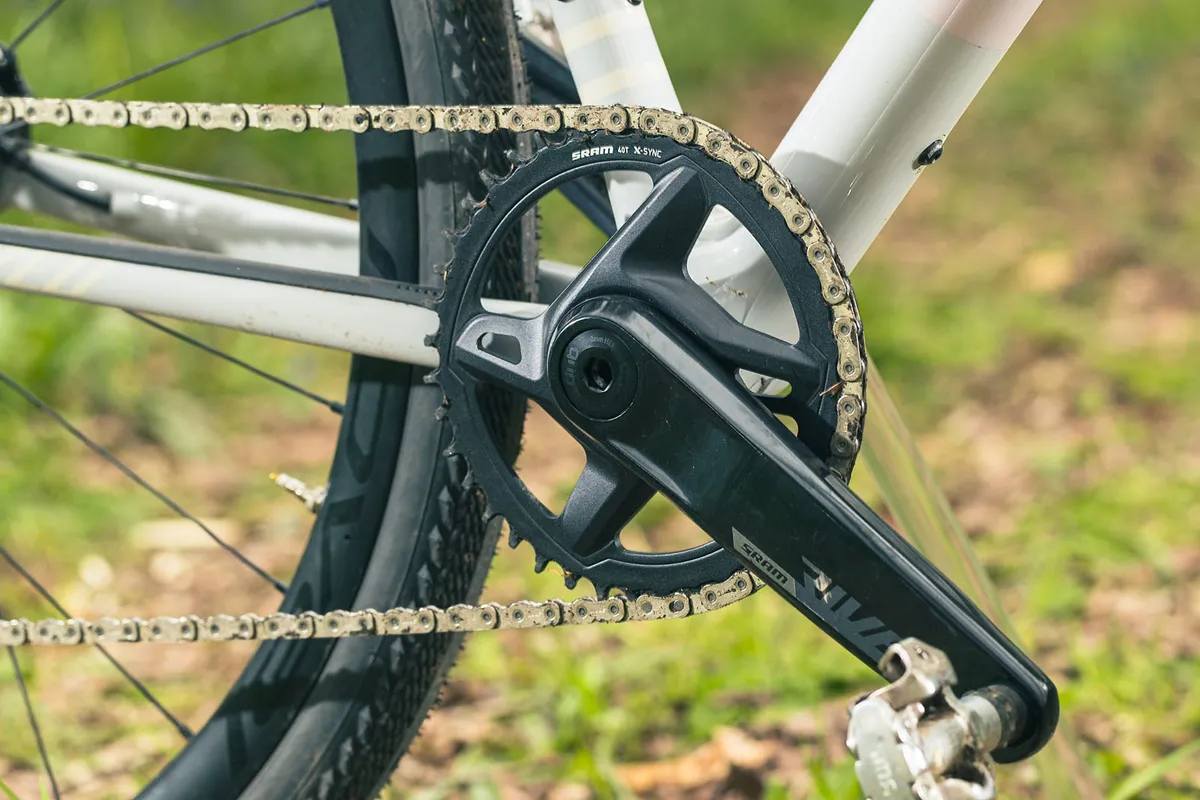
The 1x setup pairs a 40-tooth chainring and 10-44 tooth cassette. This is ample for most gravel riding, combining a mountain-scaling easiest gear ratio of less than 1:1, and a 40/10 tooth combination at the top end that’s plenty for the fastest fire roads. You could fit a smaller chainring or larger cassette if you desire an easier climbing gear.
However, considering the price of entry here, many might reasonably expect to see SRAM’s lighter and slightly more refined Force eTap AXS XPLR groupset.
The Vitus Energie EVO CRS, for example, manages to offer a Force eTap AXS groupset alongside carbon wheels and a carbon handlebar for just £3,799.
Even Cervélo’s Áspero – another racy gravel bike – undercuts the Crux Expert significantly, at £5,500 for a similar build with Rival eTap AXS and carbon wheels.
Overall, the Crux offers a firm ride. While for the most part that’s fine, on jittery, rippled gravel roads or water-bar-strewn descents, the front end can get choppy – the plush Supercaz bar tape can only do so much to quell buzz from the stiff alloy bar.
I do like the shape of the bar – the flare is subtle but welcome when you’re in the drops (and the bike's geometry really encourages you to get into them as often as possible).
On both wide-open gravel and fire roads the Crux is fast. The liveliness of the bike and its excellent handling characteristics results in quick changes of direction.
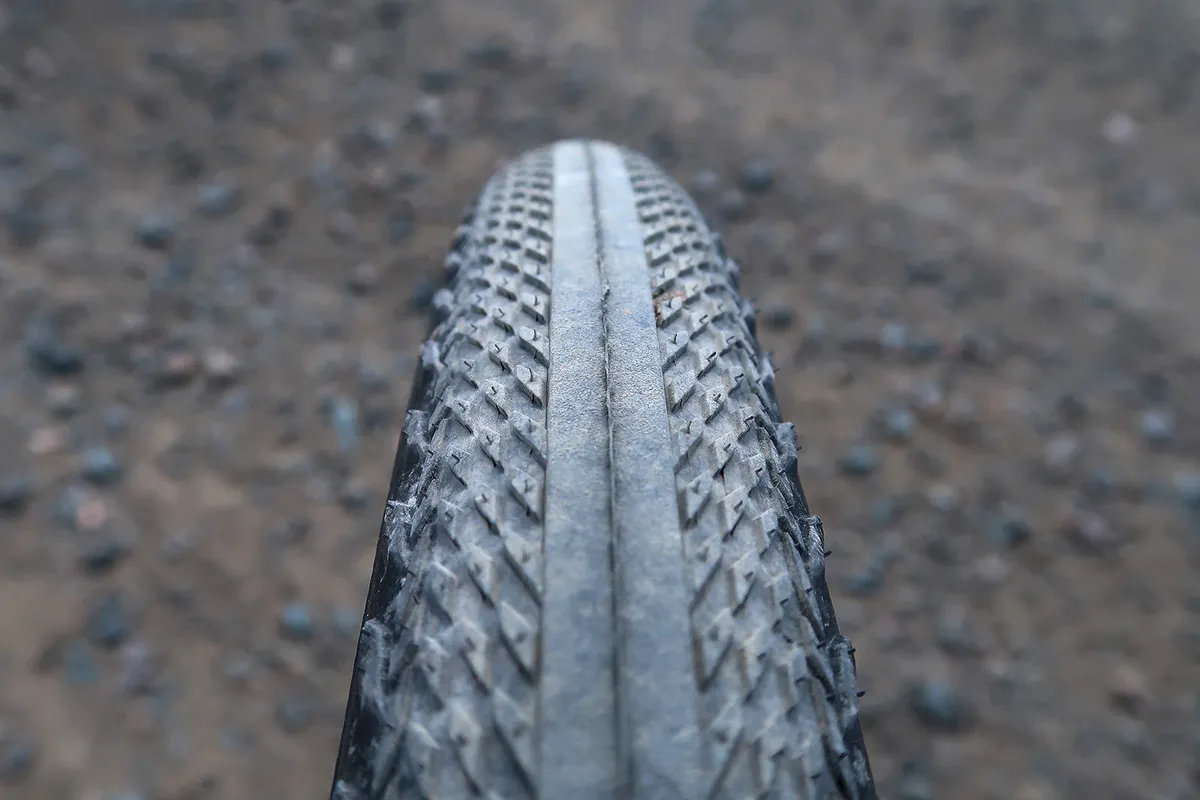
On more technical routes it can cope admirably, providing the surface conditions allow, but this is where this build’s Achilles’ heel reveals itself.
The Pathfinder tyre’s low-profile tread and solid 10mm wide centre bar give the Crux almost road bike-like speed on tarmac. But on anything more challenging than cinder bike paths they’re outmatched, especially in wet, wintery conditions in the UK.
Every wet corner is met with an uncertainty that the front end will grip, and the back end won’t slide.

Even dropping tyre pressures from 40 PSI to a soft 36 PSI doesn’t gain much in the way of traction. If the wheels and tyres were instead set up tubeless, there would be greater scope to lower the tyre pressures even further (for improved grip) without increasing the risk of pinch flats.
With that said, the Pathfinders care a good tyre for the usually dry gravel of Specialized’s California home. But on damp, boggy rides during UK February and March weather, they just don’t cut it.
With more than half a dozen punctures over the test period, all caused by bramble thorns, the Pathfinders aren’t exactly tough either.
I tested the Crux alongside several other gravel bikes during the same period and none suffered as much in this regard.
Of course, there may be some element of bad luck involved here, but if this Crux were mine, I’d be swapping the tyres (or at the very least doing a tubeless conversion) as soon as possible.
Specialized Crux Expert bottom line
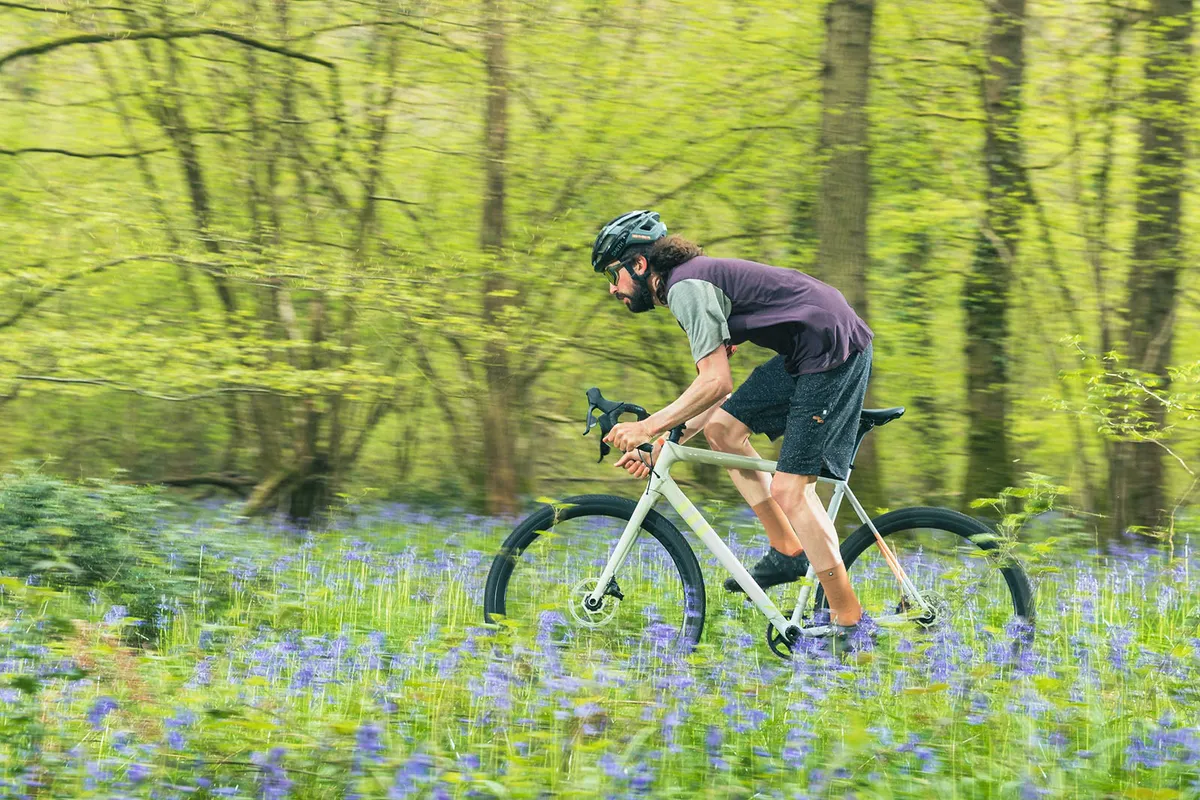
The feather-light frame and fork at the heart of the Crux is what will sell this bike, and deservedly so.
It’s a light basis for a gravel bike, it handles very well, and it’ll be easy to live with, with no complex proprietary parts to hinder upkeep or upgrading.
The ride is firmer than most, but not overly wearing. That said, with a handlebar to match the excellent seat post and saddle combination, the current disparity between front- and rear-end comfort would likely be much reduced.
The SRAM Rival eTap AXS XPLR drivetrain is simple to use and works very well, but whether it belongs on a £6,300 bike is a different question (Specialized is not completely alone in speccing this groupset to bikes around this price point). Fundamentally, it’s reasonable to expect Force eTap AXS XPLR on a bike of this price.
The tyres are also a low point, with little in the way of grip where many will need it, while they’ve been too fragile in testing.
Overall, it renders this build of the Crux compromised, despite its impressive frameset.
Product
| Brand | Specialized |
| Price | A$9200.00, €6300.00, £6300.00, $6200.00 |
| Weight | 8.35kg |
Features
| Fork | FACT 12R Carbon |
| Stem | Specialized Pro SL, alloy |
| Chain | SRAM Rival 12-speed |
| Frame | Crux FACT 10r Carbon, Rider First Engineered |
| Tyres | Specialized Pathfinder Pro 2BR 700 x 38c |
| Brakes | SRAM Rival eTAP AXS, hydraulic disc |
| Cranks | SRAM Rival 1x |
| Saddle | Body Geometry Power Expert |
| Wheels | Roval Terra C |
| Shifter | SRAM Rival eTap AXS |
| Cassette | SRAM XPLR, XG-1251, 12-speed, 10-44t |
| Seatpost | Roval Terra Carbon Seat Post, 20mm Offset |
| Grips/tape | Supacaz Super Sticky Kush tape |
| Handlebar | Specialized Adventure Gear |
| Bottom bracket | SRAM DUB BSA |
| Available sizes | 49, 52, 54, 56, 58, 61cm |
| Rear derailleur | SRAM Rival XPLR eTap AXS |
